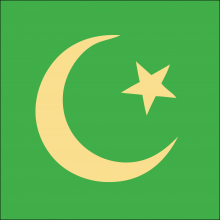
While generally regarded as an Islamic symbol today, the crescent moon and star pre-dates Islam by several thousand years. This symbol became affiliated with the Muslim world after it was adopted by the Ottoman Empire. While certainly not in uniform use among Muslims, it’s often associated with Islam because the lunar cycle has an important ritual and legal role in Islam’s calendar.
Omer Bajwa is the Director of Muslim Life, and he has office hours on Monday - Wednesday from 2:00 to 4:00 pm or by appointment in Breathing Space, located in the basement of Welch Entryway C. If you have a question and/or would like to meet, please e-mail him at omer.bajwa@yale.edu.
The Muslim Students Association (MSA) provides Yale students with the opportunity to come together in a supportive Muslim environment and seeks to educate and raise awareness about Islam in the Yale and New Haven communities. All students and community members are welcome to MSA activities and events. We recognize that students come from different backgrounds and are at varied levels in their own faith, and we welcome all.
The Musalla is Yale’s dedicated Muslim sacred space. As a “port in the storm” in the midst of Yale life, it offers a welcoming and hospitable environment for religious and social gatherings. It hosts regular congregational prayers, MSA meetings, Halaqas, game-nights, and study breaks. It is, in many ways, the locus of Muslim Life at Yale. The Musalla is located in the basement of Bingham Hall, Room 012. The room is accessible 24/7 with swipe access and a key. Please email your netID to Chaplain Omer Bajwa for swipe access to Bingham Hall, and please go to Breathing Space (in Welch C) to obtain a key from Tammie McKenzie.
The Chapel at Yale New-Haven Hospital is the best option to pray in for those around the Medical Center campus. The Chapel is located to the left of the hospital atrium.
Jumuah (Friday) Prayers are conducted weekly on campus throughout the academic year. These prayers are held in the Dwight Chapel at 1:00 pm. Khutbas (sermons) are given by a wide variety of people including students, faculty, guest Muslim chaplains, and Islamic scholars. Everyone one is welcome to attend. Please contact the Director of Muslim Life, Omer Bajwa, for more information. During recess, we encourage our community to pray off-campus at local mosques, such as Masjid al-Islam which starts Jumuah at 1:10 pm.
Halaqas (Discussion Circles) are offered weekly on Mondays at 8:00 pm in the Musalla. These Islamic study circles cover various topics including: applied theology (iman), Prophetic biography (sira), Islamic history (tarikh), practical jurisprudence (fiqh), and spiritual cultivation (ihsan).
Halal Dinners are a weekly opportunity to eat and socialize with Muslim students in a residential dining hall with Halal food.
The Eid Banquet is an annual celebration in the Fall that commemorates Abraham’s sacrifice during the Muslim holiday of Eid al-Adha and celebrates the diversity of the Yale community. To see photos of years past, please click here.
The Ivy Muslims Conference brings together hundreds of Muslim students from across the Ivy League for a weekend of networking, fellowship, and unique conversations about the intellectual and spiritual opportunities and challenges of being Muslim today.
A Halal BBQ is held at Chaplain Sharon Kugler’s house in the early-Fall to welcome new and returning students.
Islamic Awareness Week is held every year in the Spring with the purpose of better acquainting the campus community with Islam and Muslim cultures.